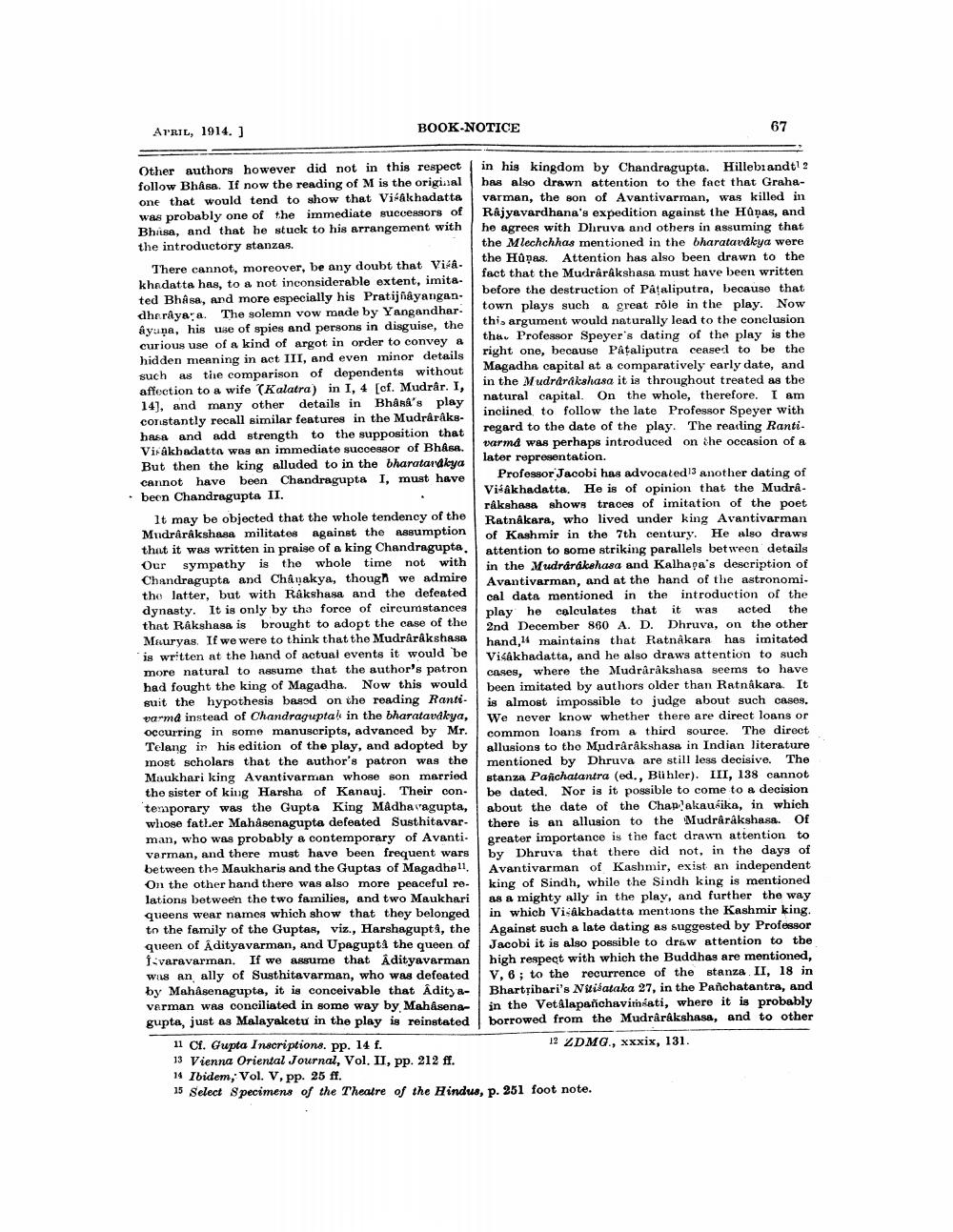________________
Arrit, 1914. ]
BOOK NOTICE
67
Other authors however did not in this respect in his kingdom by Chandragupta. Hillebrandt12 follow Bhâsa. If now the reading of M is the original has also drawn attention to the fact that Grahaone that would tend to show that Vifakhadattavarman, the son of Avantivarman, was killed in was probably one of the immediate successors of Rajyavardhana's expedition against the Hùņas, and Bhisa, and that he stuck to his arrangement with he agrees with Dhruva and others in assuming that the introductory stanzas.
the Mlechchhas mentioned in the bharatavákya were
the Hapas. Attention has also been drawn to the There cannot, moreover, be any doubt that Vif.
fact that the Mudrarakshasa must have been written khadatta has, to a not inconsiderable extent, imita. ted Bhasa, and more especially his Pratijnayangan.
before the destruction of Pataliputra, because that dheriyaya. The solemn vow made by Yangandhar.
town plays such a great rôle in the play. Now &yuna, his use of spies and persons in disguise, the
this argument would naturally lead to the conclusion curious use of a kind of argot in order to convey a
tha Professor Speyer's dating of the play is the hidden meaning in act III, and even minor details
right one, because Pataliputra ceased to be the such as the comparison of dependents without
Magadhn capital at a comparatively early date, and affection to a wife (Kalatra) in I, 4 [cf. Mudrår. I,
in the Mudrdrakshasa it is throughout treated as the 14), and many other details in Bhana's play
natural capital. On the whole, therefore. I am constantly recall similar features in the Mudrárákg.
inclined to follow the late Professor Speyer with hasa and add strength to the supposition that
regard to the date of the play. The reading Ranti. Visakhadatta was an immediate successor of Bhasa.
varmd was perhaps introduced on che occasion of a But then the king alluded to in the bharatardkya
later representation. cannot have been Chandragupta I, must have
Professor Jacobi has advocated 13 another dating of • been Chandragupta II.
Visakhadatta. He is of opinion that the Mudra.
rakshasa shows traces of imitation of the poet It may be objected that the whole tendency of the
Ratnakara, who lived under king Avantivarman Mudrârâkshasa militates against the Assumption
of Kashmir in the 7th century. He also draws that it was written in praise of a king Chandragupta.
attention to some striking parallels between details Our sympathy is the whole time not with
in the Mudrarakshasa and Kalhapa's description of Chandragupta and Chanakya, though we admire
Avantiverman, and at the hand of the astronomi. the latter, but with Rakshasa and the defeated
cal data mentioned in the introduction of the dynasty. It is only by tho force of circumstances
play he calculates that it was acted the that Rakshasa is brought to adopt the case of the
2nd December 850 A. D. Dhruva, on the other Mauryas. If we were to think that the MudrarAkshasa
hand, maintains that Ratnakarahas imitated is written at the hand of actual events it would be
Visakhadatta, and he also draws attention to such more natural to assume that the author's patron
cases, where the Mudråråkshasa seems to have had fought the king of Magadha. Now this would
been imitated by authors older than Ratnakara. It suit the hypothesis based on the reading Ranti
is almost impossible to judge about such cases. varma instead of Chandraguptak in the bharatavdlya,
We never know whether there are direct loans or occurring in some manuscripts, advanced by Mr. common loans from a third source. The direct
lang in his edition of the play, and adopted by allusions to tho Mudrarakshasa in Indian literature most scholars that the author's patron was the mentioned by Dhruva are still less decisive. The Maukhari king Avantivarman whose son married stanza Panchatantra (ed., Buhler). III, 138 cannot the sister of king Harsha of Kanauj. Their con- be dated. Nor is it possible to come to a decision tenaporary was the Gupta King Madhavagupta, about the date of the Chapakaušika, in which
ose tatt.er Mahasenagupta defeated Susthitavar. there is an allusion to the Mudråråkshasa. Of man, who was probably a contemporary of Avanti. greater importance is the fact drawn attention to varman, and there must have been frequent wars by Dhruva that there did not, in the days of between the Maukharis and the Guptas of Magadhell, Avantivarman of Kashmir, exist an independent On the other hand there was also more peaceful re- king of Sindh, while the Sindh king is mentioned lations between the two families, and two Maukhari as a mighty Ally in the play, and further the way queens wear names which show that they belonged in which Visakhadatta mentions the Kashmir king. to the family of the Guptas, viz., Harshagupta, the Against such a late dating as suggested by Professor queen of Adityavarman, and Upagupti the queen of Jacobi it is also possible to draw attention to the
.varavarman. If we assume that Adityavarman high respect with which the Buddhas are mentioned, Wis an ally of Susthitavarman, who was defeated V, 6; to the recurrence of the stanza II, 18 in by Mahasenagupta, it is conceivable that Aditya- Bhartribari's Nuisataka 27, in the Panchatantra, and varman was conciliated in some way by Mahasena in the VetAlapanchaviniati, where it is probably gupta, just as Malayaketu in the play is reinstated borrowed from the Mudrårákshasa, and to other 11 Cf. Gupta Inscriptions. pp. 14 f.
12 ZDMG., xxxix, 131. 13 Vienna Oriental Journal, Vol. II, pp. 212 ff. 14 Ibidem, Vol. V, pp. 25 ff. 15 Select Specimens of the Theatre of the Hindus, p. 251 foot note.




